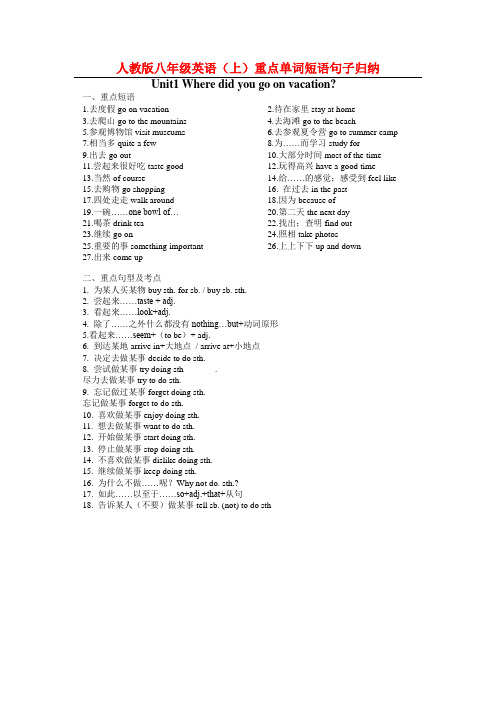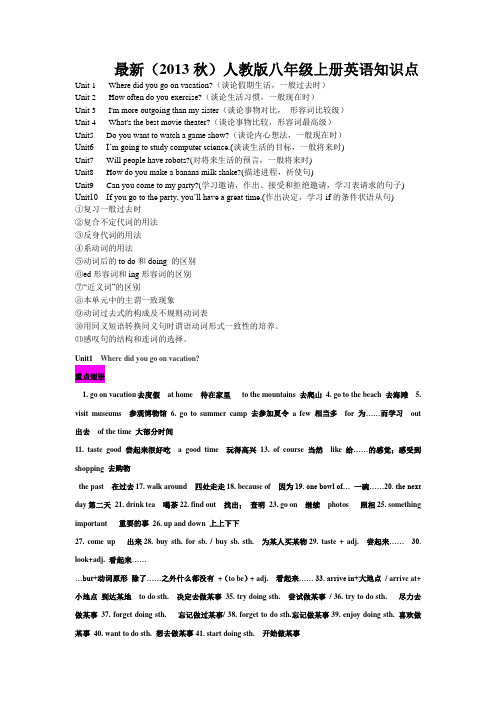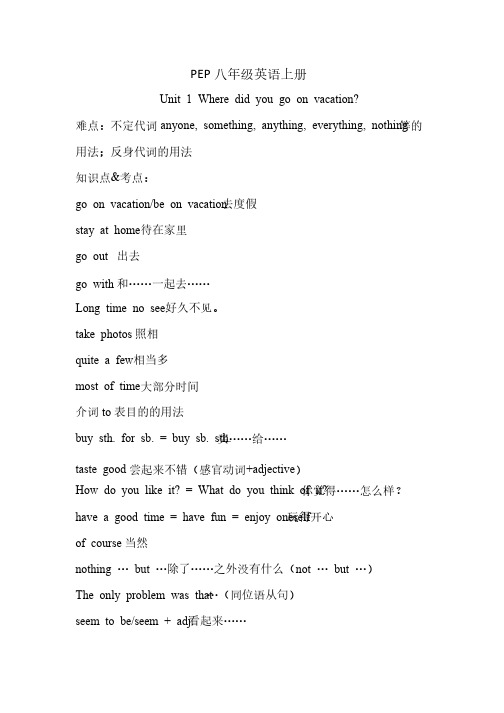新目标八年级英语上册知识点总结-新目标[整理]
人教版新目标八年级英语上册各单元重点单词和短语梳理归纳

人教版八年级英语(上)重点单词短语句子归纳Unit1 Where did you go on vacation?一、重点短语1.去度假go on vacation2.待在家里stay at home3.去爬山go to the mountains4.去海滩go to the beach5.参观博物馆visit museums6.去参观夏令营go to summer camp7.相当多quite a few8.为……而学习study for9.出去go out 10.大部分时间most of the time 11.尝起来很好吃taste good 12.玩得高兴have a good time13.当然of course 14.给……的感觉;感受到feel like 15.去购物go shopping 16. 在过去in the past17.四处走走walk around 18.因为because of19.一碗……one bowl of… 20.第二天the next day21.喝茶drink tea 22.找出;查明find out23.继续go on 24.照相take photos25.重要的事something important 26.上上下下up and down27.出来come up二、重点句型及考点1. 为某人买某物buy sth. for sb. / buy sb. sth.2. 尝起来……taste + adj.3. 看起来……look+adj.4. 除了……之外什么都没有nothing…but+动词原形5.看起来……seem+(to be)+ adj.6. 到达某地arrive in+大地点/ arrive at+小地点7. 决定去做某事decide to do sth.8. 尝试做某事try doing sth .尽力去做某事try to do sth.9. 忘记做过某事forget doing sth.忘记做某事forget to do sth.10. 喜欢做某事enjoy doing sth.11. 想去做某事want to do sth.12. 开始做某事start doing sth.13. 停止做某事stop doing sth.14. 不喜欢做某事dislike doing sth.15. 继续做某事keep doing sth.16. 为什么不做……呢?Why not do. sth.?17. 如此……以至于……so+adj.+that+从句18. 告诉某人(不要)做某事tell sb. (not) to do sthUnit 2 How often do you exercise?一、根据汉语写短语。
人教版新目标八年级英语上册1、2、3、4单元知识点总结材料

新目标八年级英语上册第一单元Unit 1.How often do you exercise?I. 重点短语归纳:on weekends 在周末1. go to the movies 去看电影2. look after=take care of 照顾、照看3. surf the internet 上网4. healthy lifestyle 健康的生活方式5. go skateboarding 去滑滑板watch TV看电视6. keep healthy=stay healthy = keep in good health 保持健康keep + 形容词表保持某种状态do some reading 阅读7. exercise= take/do (much) exercise=do sports锻炼8. eating habits 饮食习惯9. take more exercise 做更多的运动10. the same as 与什么相同11. once a month一月一次12. be different from 不同13. twice a week一周两次.three times a week一周三次14. make a difference to 对什么有影响As teachers, you must believe that you can make a difference to the li ves of your students. 身为教师,你们必须坚信你们能够影响学生的一生。
A false step will make a great difference to my future.错走一步对我的前程来说会产生很大影响。
15.how often 多久一次,询问动作发生的频率一般用once a week ,twice a month ,every day ,sometimes等回答。
八年级英语上册知识点总结(全)

八年级英语上册知识点总结人教新目标版Unit 1 How often do you exercise?一、词组go to the movies 去看电影look after=take care of 照顾surf the internet 上网healthy lifestyle 健康的生活方式go skate boarding 去划板keep healthy=stay healthy 保持健康eating habits 饮食习惯take more exercise 做更多的运动the same as 与什么相同once a month 一月一次be different from 不同twice a week 一周两次make a difference to 对什么有影响how often 多久一次although=though虽然as for 至于activity survey活动调查do homework做家庭作业do housework做家务事eat less meat 吃更少的肉junk food垃圾食物be good for 对什么有益be bad for对什么有害want to do sth 想做某事want sb to do sth想某人做某事try to do sth 尽量做某事come home from school放学回家of course=certainly=sure 当然get good grades 取得好成绩some advice 一些建议most of the students=most students 大多数学生shop=go shopping=do some shopping 购物exercise=take (much) exercise=do sports 锻炼help sb to do sth=help sb with sth 帮助某人做某事a lot of vegetables=many vegetables 许多蔬菜hardly=not nearly/almost not 几乎不keep/be in good health保持健康二、词汇精讲1、always、usually、often、sometimes、hardly ever和neveralways、usually、often、sometimes、hardly ever和never是英语中最常见的频度副词。
新目标英语8年级上册1-5单元知识点

最新(2013秋)人教版八年级上册英语知识点Unit 1 Where did you go on vacation?(谈论假期生活,一般过去时)Unit 2 How often do you exercise?(谈论生活习惯,一般现在时)Unit 3 I'm more outgoing than my sister(谈论事物对比,形容词比较级)Unit 4 What's the best movie theater?(谈论事物比较,形容词最高级)Unit5 Do you want to watch a game show?(谈论内心想法,一般现在时)Unit6 I’m going to study computer science.(谈谈生活的目标,一般将来时)Unit7 Will people have robots?(对将来生活的预言,一般将来时)Unit8 How do you make a banana milk shake?(描述进程,祈使句)Unit9 Can you come to my party?(学习邀请,作出、接受和拒绝邀请,学习表请求的句子) Unit10 If you go to the party, you’ll have a great time.(作出决定,学习if的条件状语从句)①复习一般过去时②复合不定代词的用法③反身代词的用法④系动词的用法⑤动词后的to do和doing 的区别⑥ed形容词和ing形容词的区别⑦“近义词”的区别⑧本单元中的主谓一致现象⑨动词过去式的构成及不规则动词表⑩用同义短语转换同义句时谓语动词形式一致性的培养。
⑾感叹句的结构和连词的选择。
Unit1 Where did you go on vacation?重点短语1. go on vacation去度假at home 待在家里to the mountains 去爬山4. go to the beach 去海滩 5. visit museums 参观博物馆6. go to summer camp 去参加夏令a few 相当多for 为……而学习out 出去of the time 大部分时间11. taste good 尝起来很好吃 a good time 玩得高兴13. of course 当然like 给……的感觉;感受到shopping 去购物the past 在过去17. walk around 四处走走18. because of 因为19. one bowl of… 一碗……20. the next day第二天21. drink tea 喝茶22. find out 找出;查明23. go on 继续photos 照相25. something important 重要的事26. up and down 上上下下27. come up 出来28. buy sth. for sb. / buy sb. sth. 为某人买某物29. taste + adj. 尝起来…… 30. look+adj. 看起来………but+动词原形除了……之外什么都没有+(to be)+ adj. 看起来…… 33. arrive in+大地点/ arrive at+小地点到达某地to do sth. 决定去做某事35. try doing sth. 尝试做某事/ 36. try to do sth. 尽力去做某事37. forget doing sth. 忘记做过某事/ 38. forget to do sth.忘记做某事39. enjoy doing sth. 喜欢做某事40. want to do sth. 想去做某事41. start doing sth. 开始做某事42. stop doing sth. 停止做某事43. have a good time=enjoy oneself=have fun(doing sth.)玩得痛快44. keep doing sth. 继续做某事45. Why not do. sth.? 为什么不做……呢46. so+adj.+that+从句如此……以至于…… 47. tell sb. (not) to do sth. 告诉某人(不要)做某事三、重点句子:1. Where did you go on vacation? 你去哪儿度假的?2. Long time no see. 好久不见。
人教新目标八年级英语上册重难点知识点归纳

PEP八年级英语上册八年级英语上册Unit 1 Where did you go on vacation? 难点:不定代词anyone, something, anything, everything, nothing等的用法;反身代词的用法用法;反身代词的用法知识点&考点:考点:go on vacation/be on vacation 去度假去度假stay at home 待在家里待在家里待在家里go out 出去出去go with 和……一起去……和……一起去……Long time no see. 好久不见。
好久不见。
take photos 照相照相quite a few 相当多相当多相当多most of time 大部分时间大部分时间大部分时间表目的的用法介词to表目的的用法buy sth. for sb. = buy sb. sth. 买……给……买……给……taste good 尝起来不错(感官动词+adjective)How do you like it? = What do you think of it? 你觉得……怎么样?你觉得……怎么样?have a good time = have fun = enjoy oneself玩得开心玩得开心of course 当然当然nothing …but …除了……之外没有什么(not …but …)…)The only problem was that …(同位语从句)…(同位语从句)seem to be/seem + adj. 看起来……看起来……keep a diary 记日记记日记记日记 + at + 小地点小地点小地点arrive + in + 大地点大地点大地点 decide to do 决定做某事决定做某事决定做某事 try doing sth. 尝试做某事尝试做某事尝试做某事 try to do sth. 尽力做某事尽力做某事feel like 感觉到感觉到 feel like + n./ v-ing 想要……想要……ride … to …骑……到………骑……到……许多的:a lot of + 可数名词可数名词 lots of + 可数可数or 不可数名词不可数名词 I wonder that …我想知道………我想知道………我想知道…… in the past 在过去在过去在过去 enjoy doing sth. 享受做某事享受做某事享受做某事 walk around 到处逛逛到处逛逛感叹句:What + 冠词冠词 + adj. + n. + (it is) = How + adj. + 冠词冠词 + n. + (it is) start start doing doing doing sth. sth. 开始做某事开始做某事 stop stop doing doing doing sth. sth. 停止做某事停止做某事 finish finish doing doing sth. 结束做某事结束做某事because & so (不可同用)(不可同用)(不可同用) wait for …等待………等待……because of + n. a little/ a few 一些(两者的区别,以及与little/few 的区别)的区别) enough + n. / adj. + enough as + adj./adv. + as 和……一样……和……一样……one bowl of …一碗………一碗……along the way 沿着这条路沿着这条路沿着这条路 时间段+ later = after + 时间段……之后时间段……之后other, others, the other, the others, another on trip 在旅途中在旅途中find out 找到,找出找到,找出 / find 寻找寻找 / look for 寻找寻找寻找 so + adj. + that + 从句如此……以致……从句如此……以致……tell sb. (not) to do sth. 告诉某人(不要)做某事告诉某人(不要)做某事keep doing sth. / go on doing sth. 继续做某事继续做某事keep sth. + adj. 使……保持……状态使……保持……状态up and down (人)来来往往;(人)来来往往;(物)上上下下(物)上上下下in excitement = excitedly 兴奋地兴奋地come up / come out / come on / come in forget to do sth. 忘记做某事忘记做某事 forget doing sth. 忘记做过某事忘记做过某事忘记做过某事 like / dislike + n. / v-ing 喜欢/不喜欢某物/做某事做某事something + adj. ……的事情……的事情……的事情 Why not + v. = Why don ’t you + v. 为什么不……呢?为什么不……呢?Unit 2 How often do you exercise? 重点:1. How often 句型的运用;2. 2. 六个频度副词六个频度副词never, hardly ever, sometimes, sometimes, often, often, often, usually, usually, usually, always always 的差异、理解及使用;3. 频率数词once, twice 等的认识和运用;4. 一般现在时不同人称谓语形式的变化及一般疑问句的问答。
人教版新目标八年级英语上册1、2、3、4单元知识点总结

新目标八年级英语上册第一单元Unit often do you exerciseI. 重点短语归纳:on weekends 在周末1. go to the movies 去看电影2. look after=take care of 照顾、照看3. surf the internet 上网4. healthy lifestyle 健康的生活方式%5. go skateboarding 去滑滑板watch TV看电视6. keep healthy=stay healthy = keep in good health 保持健康keep + 形容词表保持某种状态do some reading 阅读7. exercise= take/do (much) exercise=do sports锻炼8. eating habits 饮食习惯9. take more exercise 做更多的运动>10. the same as 与什么相同11. once a month一月一次12. be different from 不同13. twice a week一周两次.three times a week一周三次14. make a difference to 对什么有影响As teachers, you must believe that you can make a difference to the lives of your students. 身为教师,你们必须坚信你们能够影响学生的一生。
A false step will make a great difference to my future.错走一步对我的前程来说会产生很大影响。
15.%16.how often 多久一次,询问动作发生的频率一般用once a week ,twice amonth ,every day ,sometimes等回答。
新人教新目标版八年级英语上册短语语法知识点汇总
人教版八年级英语上册短语语法知识点总结初二英语课组2019年[由我校初二英语科组根据最新考纲和近几年中考的趋势加上我校学生的实际情况,结合初二全体英语科组的力量,汇编了这一份重点总结,编好一份学案不易,望同学们能好好利用。
]Unit 1 Where did you go on vacation一、必背单词短语。
Section A1.Where did you go on vacation? (P. 1)on vacation意为“在度假”,结构“on+名词”表示“在某种状态中”。
例句:My family went to Hainan on vacation last year.2....visited my uncle (P. 1)visit此处用作及物动词,后接人或物做宾语,意为“拜访、看望”,后接表示地点的名词,意为“参观、游览”。
例句:I visited my grandmother last week.例句:Do you want to visit Shanghai?3....go with anyone? (P. 2)(1)anyone用作不定代词,意为“有人、任何人”,相当于anybody,用于疑问句和否定句中,在肯定句中用someone或者somebody。
但是anyone也可以用在肯定句中,表示“任何一个人”。
例句:Did you meet anyone friendly in that city?例句:Anyone can be helpful in some way.(2)anyone只能指人,不可以指物,后面不接of短语;any one既可以指人也可以指物,后可接of短语。
例句:You can ask any one of us about this question.4....buy anything special? (P. 2)(1)buy用作双宾语动词,表示“买”,常用的结构为“buy sb. sth.”或者“buy sth. for sb.”,表示“为某人买某物”。
八年级英语上册1-4单元知识点总结
新目标八年级英语上册第一单元Unit 1.How often do you exercise?I. 重点短语归纳:on weekends 在周末1. go to the movies 去看电影2. look after=take care of 照顾3. surf the internet 上网4. healthy lifestyle 健康的生活方式5. go skateboarding 去滑滑板watch TV看电视6. keep healthy=stay healthy = keep in good health 保持健康keep + 形容词表保持某种状态do some reading 阅读7. exercise= take/do (much) exercise=do sports锻炼8. eating habits 饮食习惯9. take more exercise 做更多的运动10. the same as 与什么相同11. once a month一月一次12. be different from 不同13. twice a week一周两次.three times a week一周三次14. make a difference to 对什么有影响As teachers, you must believe that you can make a difference to the lives of your st udents.身为教师,你们必须坚信你们能够影响学生的一生。
A false step will make a great difference to my future.错走一步对我的前程来说会产生很大影响。
15. how often 多久一次,询问动作发生的频率how many times 多少次,用来提问做某事的次数16. although=though虽然<不能与but连用>Although he is old, he is quite strong.(He is old, but he is quite strong.)句子中,有although或though就不可再用but,但可用yet或still“仍然,还”;有because就不能再用so.17. most of the students=most students大多数学生18. shop=go shopping=do some shopping 购物19. as for至于20. activity survey活动调查21. do homework做家庭作业22. do house work做家务事23. eat less meat吃更少的肉24. junk food垃圾食物25. be good for 对什么有益26. be bad for对什么有害27. want to do sth 想做某事28. want sb to do sth想某人做某事29. try to do sth 尽量做某事30. come home from school放学回家31. of course=certainly=sure当然32. get good grades取得好成绩33. some advice 一些建议some advice 中的advice 是不可数名词 a piece of advice 一则建议 give advice 提出建议take one’s advice 采纳或听从某人的建议4. help sb to do sth帮助某人做某事=help sb with sth35. a lot of vegetables=many vegetables许多蔬菜36. hardly= almost not几乎不hardly ever很少,几乎不,从不37. keep/be in good health保持健康38.your favorite program你最喜欢的节目39. Animal World 动物世界40. play soccer踢足球41.every day 每天every day 与everyday1. every day 作状语,译为“每一天”。
新目标英语八年级上册U1-u2知识点
新目标英语八年级上册U1-U2知识点整理Unit 1 Where did you go on vacation?(谈论假期生活,一般过去时)一.惯用法:1. buy sth for ab./ buy sb. sth 为某人买某物2. taste + adj. 尝起来……3. nothing ….but + V.(原形) 除了……之外什么都没有4. seem + (to be) + adj 看起来5. arrive in + 大地方/ arrive at + 小地方到达某地6. decide to do sth. 决定做某事7. try doing sth. 尝试做某事/ try to do sth. 尽力做某事8. enjoy doing sth. 喜欢做某事9. want to do sth. 想去做某事10. start doing sth. 开始做某事11. stop doing sth. 停止做某事区:stop to do sth 12. look + adj 看起来13. dislike doing sth. 不喜欢做某事14. Why not do sth?=Why don’t you do sth?15. so + adj + that + 从句如此……以至于……(两种同义句)16. tell sb. (not) to do sth. 告诉某人(不要)做某事17. keep doing sth. 继续做某事seem like ….好像,似乎….. It seems like a god idea.3. decide to do sth.决定做某事They decide to visit the museum.4. start doing sth = start to do sth. 开始,可与begin 互换5. over 介词,多于,超过,在…以上(表示数目、程度)= more thanMy father is over 40 years old.6. too many 太多,后接可数名词复数:Mother bought too many eggs yesterday.too much 太多,修饰不可数名词,修饰动词作状语。
新目标八年级上册英语语法知识点
人教版新目标八年级上册英语语法知识点一一般将来时一般将来时表示将来某个时间要发生的动作或者存在的状态;通常与表示将来的时间状语连用,如tomorrow, the day after tomorrow, next year, next month, next week, in 100 years等;be going to do动词原形结构:表示打算、准备做的事情或者肯定要发生的事情;如:It is going to rain.will do结构表示将来的用法:1. 表示预见Do you think it will rainYou will feel better after a good rest.2. 表示意图I will borrow a book from our school library tomorrow.What will she do tomorrow基本构成如下:一般疑问句构成:1will+主语+do… Will Sarah come to visit me next Sunday2there be 结构的一般疑问句:Will there + be …Will there be fewer trees Yes, there will. / No, there won’t否定句构成:will + not won’t+doSarah won’t come to visit me next Sunday.特殊疑问句构成:特殊疑问词+will+主语+…What will Sarah do next Sunday★★练一练★★根据例句,用will改写下列各句例:I don’t feel well today. be better tomorrowI’ll be better tomorrow.1. Gina has six classes today. have a lot of homework tonight_____________________________2. I’m tired now. sleep later_____________________________3. My parents need a new car. buy one soon_____________________________4. We can’t leave right now. leave a little later_____________________________5. The weather is awful today. be better tomorrow_____________________________答案:1. She’ll have a lot of homework tonight.2. I’ll sleep later.3. They’ll buy one soon.4. We’ll leave a little later.5. Maybe it’ll be better tomorrow.二should的用法:should用来提出建议和忠告,后边加动词原形,否定句直接在should后边加not.例如:I think you should eat less junk food.我认为你应该少吃垃圾食品;She drives a lot and she seldom walks. So I think she should walk a lot.她经常开车,很少走路;所以我认为她应该多走路;Students shouldn’t spend too much time playing computer games.学生们不应当花太多的时间玩计算机游戏;学习向别人提建议的几种句式:1I think you should…2Well, you could…3Maybe you should …4Why don’t you…5What about doing sth.6You’d better do sth.★★练一练★★用should或shouldn’t填空1. I can’t sleep the night before exams.You ______ take a warm shower before you go to bed.2. Good friends ______ argue each other.3. There is little milk in the glass. We _______ buy some.4. They didn’t invite you Maybe you ______ be friendlier.5. I am a little bit overweight. So I think I _______ do exercises every day.答案:1. should 2. shouldn’t 3. should 4. should 5. should三过去进行时过去进行时表示过去某一点时间正在进行的动作或者过去某一段时间内一直进行的动作;1. 构成was /were + doing,例如:I was watching TV at 9 o’clock last night.at 9 o’clock last night是时间点They were playing football all afternoon.all afternoon是时间段2. 过去进行时的标志词at 8 o’clock last night, this time yesterday等;例如:I was having lunch at home this time yesterday.昨天的这个时候我正在吃午饭;At that time she was writing a book.那阵子她在写一本书;表示她在那段时间里一直在做那件事情;★★练一练★★用括号中所给动词的适当形式填空;1. This time yesterday I ____ ______readbooks.2. At 9 o’clock last Sunday they ______ ______havea party.3. When I _____comeinto the classroom, she ________ ______reada storybook.4. She _____ ______playcomputer games while her mother ____ ______cookyesterday afternoon.5. I _____ ______havea shower when you _______callme yesterday.答案:1. was reading 2. were having 3. came; was reading4. was playing; was cooking5. was having; called四间接引语形成步骤:1不要逗号,冒号,引号2要考虑到人称的变化人称的变化与汉语是一致的3要考虑时态的变化4要考虑时间状语、地点状语和语示代词的变化;★★练一练★★用括号中所给动词的适当形式填空;1. She said I _____behard-working.2. Peter told me he _____bebored yesterday.3. She said she _____goswimming last Sunday.4. Bobby said he _____maycall me later.5. Antonio told me he _____reada book then.答案:1. was 2. was 3. went 4. might 5. was reading请转述他人说的话:1. I go to the beach every Saturday. Tom2. I can speak three languages. Lucy3. I will call you tomorrow. Mike4. I’m having a surprise party for Lana. she五if引导的条件状语从句结构:if+一般现在时,主语+将来时含义:如果……,将要……例如:If you ask him, he will help you.如果你请求他,他会帮助你;If need be, we’ll work all night.如果需要,我们就干个通宵;★★练一练★★根据中文提示,完成句子;1. 如果你参加聚会,你将会过得很开心;If you ________ the party, you __________.2. 如果明天下雨,我们将不去野餐;If it __________ tomorrow, we ___________.3. 如果你经常听英文歌,你将会喜欢英语的;If you often ________, you _________________.答案:1. If you go to the party, you will have a good time2. If it rains tomorrow, we won’t go to the picnic3. If you often listen to English songs, you’ll like English二. 完形填空特点及解题思路一题型分类与特点完形填空试题是在给出的一篇短文中有目的地拿掉若干个词,留下一些空格,要求考生借助短文保留的部分,从所给的短文整体出发,在正确理解短文意思的基础上,根据句子和句子间的内在联系、词的用法和习惯搭配等,用适当的词或词语填空,使补全后的短文意思通顺、前后连贯、结构完整;这种题型测试的内容从形式上看是单词或短语的填空,但它必须注意到短文中上、下文意思连贯、词语搭配和语法结构正确,所以在空格上所填的词必须符合语义适用和语法正确两条原则,只考虑某一侧面都可能导致错误;中考中完形填空试题的基本题型分两类:完形填空选择题和完形填空题;1. 完形填空选择题:该题型的特点是将一篇短文中若干词语抽掉留下空格,对每一空格提供若干个选择项,要求考生通读短文后,在理解短文意思的基础上,运用所学的词汇、句型、语法等语言知识,从所提供的备选项中选出一个最佳答案,使短文内容完整正确;中考完形填空主要以这种题型为主;它所给的短文一般与初中英语教材难易程度相当,字数在150-200个单词之内,多数设置10个左右空格,所设考点涉及词汇、语法及对短文内容的理解;短文的第一句一般不设空,以期提供一个语境,对每一空格设置的选项基本都属于相同或对等的词类,给判定选择带来一定的干扰,侧重考查了考生准确运用词汇的能力及对短文的整体理解和逻辑推理能力;2. 选词填空题:该题型的特点是把抽出的词打乱顺序,不按原文顺序排列,放在短文前面或后面的方框内,有时还增加几个文外的词,要求考生从中选出适当的词以正确的形式填入短文空格内;AJack wanted to ask for two days off, 1 he had only learnt the phrase 短语“have a day off”. He 2 , then he had an idea. “Grandmother is ill. May I have a day off, 3 ”he asked the teacher. “Of course, you can. ”replied 答复the teacher at once. After a while, the boy came to 4 at the teacher’s door. “May I have a day off 5 ”The teacher was very surprised, “Didn’t you 6 it just now”“Yes, sir. But I can’t be here 7 , either. ”The teacher understood him and could not help 8 . Then he said with a smile, “Why didn’t you say‘May I have two days off ’”The boy answered quickly 9 a loud voice. “But you only 10 us‘have a day off ’”1. A. but B. and C. or D. for2. A. thought hardlyB. thought hard and hardC. hard thoughtD. thought and thought3. A. Miss B. sir C. teacher D. Mr4. A. strike B. best C. hit D. knock5. A. also B. again C. too D. once6. A. speak B. tell C. say D. do7. A. tomorrowB. the day after tomorrowC. yesterdayD. the day before yesterday8. A. laugh B. to laugh C. laughed D. laughing9. A. with B. on C. in D. by10. A. teach B. taught C. are teaching D. were teachingB请根据内容从所给的15个单词中选出最恰当的10个填入空白处,使短文完整,有些词要根据需要作A generation gap 代沟has become a serious problem. I read a _______1about it in the newspaper. Some children have killed _______2after quarrels 争吵with parents. I think this is _______3they don’t have a good talk with each o ther. Parents now spend _______4time in the office. _______5they don’t have much time to stay with their children. As time passes, they both feel _______6they don’t have the same topics话题to talk about. I want to_______7parents to be more with your children, get to know them and understand them. And for children, show your feeling _______8your parents. They are the people who _______9you. So tell them your thoughts 想法. In this way, you can have a better _______10of each other.完形填空选择题的一般解题思路是:1. 跳过空格、通读全文、把握大意;先跳过空格,通读试题所给的要完形填空的短文,获得整体印象,做到弄清文脉、抓住主旨,较好地把握短文大意;要在阅读理解短文意思的基础上才开始判定选择,切忌仓促下笔;2. 结合选项、综合考虑、初定答案;在理解全文意思的基础上,再结合所给备选项细读全文,联系上、下文内容,注意从上、下文的语法结构和词语搭配及从选择项中寻找解题的提示,以词、句的意义为先,再从分析句子结构入手,根据短文意思、语法规则、词语固定搭配等进行综合考虑,对备选项逐一进行分析、比较和筛选,排除干扰项、初步选定答案;3. 瞻前顾后、先易后难、各个击破;动笔时要瞻前顾后、通篇考虑、先易后难;对比较明显直接的、自己最有把握的答案先做,一下子不能确定答案的,先跳过这一空格,继续往下做,最后回过头来再集中精力解决难点;这时可结合已确定答案的选项再读一遍短文,随着对短文理解的深入,可以降低试题的难度,提高选择的正确率;4. 复读全文、逐空验证、弥补疏漏;完成各道题选择后,把所选的答案代入原文,再把全文通读一篇,逐空认真复查;看所选定的答案是否使短文意思前后连贯、顺理成章,语法结构是否正确,是否符合习惯表达法;如发现错误答案或有疑问的,应再次推敲、反复斟酌、做出修正;完形填空试题的一般解题思路是:1. 跳过空格、通读短文、了解大意;解题时先跳过空格,通读完形填空的短文,了解全篇的内容和要旨;要重视首句,善于以首句的时态、语气为立足点,理清文脉,推测全文主题及大意;2. 复读短文、确定语义、判断词形;把握短文大意后再认真复读短文,利用上下文的语境,结合所学过的知识,先确定空格处所需词语的意义,再根据空格在句子中的位置,判断其在句中充当的成分,从而确定所填词的词性,再依据词语搭配和语法规则,判断所填的词的正确形式;3. 三读短文、上下参照、验证答案;在短文的每一空白处填上一个词后,将完成的短文再细读一遍,上下参照,连贯思考;把所填的答案放入短文中进行检验,可从上、下文内容是否协调一致、顺理成章,语法结构是否正确无误等进行综合验证,凡有疑问必须重新推敲考虑;。
- 1、下载文档前请自行甄别文档内容的完整性,平台不提供额外的编辑、内容补充、找答案等附加服务。
- 2、"仅部分预览"的文档,不可在线预览部分如存在完整性等问题,可反馈申请退款(可完整预览的文档不适用该条件!)。
- 3、如文档侵犯您的权益,请联系客服反馈,我们会尽快为您处理(人工客服工作时间:9:00-18:30)。
新目标八年级英语上册语法复习1) leave的用法1.“leave+地点”表示“离开某地”。
例如:When did you leave Shanghai?你什么时候离开上海的?2.“leave for+地点”表示“动身去某地”。
例如:Next Friday, Alice is leaving for London.下周五,爱丽斯要去伦敦了。
3.“leave+地点+for+地点”表示“离开某地去某地”。
例如:Why are you leaving Shanghai for Beijing?你为什么要离开上海去北京?2) 情态动词should“应该”学会使用should作为情态动词用,常常表示意外、惊奇、不能理解等,有“竟会”的意思,例如:How should I know? 我怎么知道?Why should you be so late today? 你今天为什么来得这么晚?should有时表示应当做或发生的事,例如:We should help each other.我们应当互相帮助。
我们在使用时要注意以下几点:1.用于表示“应该”或“不应该”的概念。
此时常指长辈教导或责备晚辈。
例如:You should be here with clean hands. 你应该把手洗干净了再来。
2. 用于提出意见劝导别人。
例如:You should go to the doctor if you feel ill.如果你感觉不舒服,你最好去看医生。
3. 用于表示可能性。
should的这一用法是考试中常常出现的考点之一。
例如:We should arrive by supper time. 我们在晚饭前就能到了。
She should be here any moment. 她随时都可能来。
3) What...? 与Which...?1. what 与 which 都是疑问代词,都可以指人或事物,但是what仅用来询问职业。
如:What is your father? 你父亲是干什么的?该句相当于:What does your father do?What is your father's job?Which 指代的是特定范围内的某一个人。
如:---Which is Peter? 哪个是皮特?---The boy behind Mary. 玛丽背后的那个男孩。
2.What...? 是泛指,所指的事物没有范围的限制;而 Which...? 是特指,所指的事物有范围的限制。
如:What color do you like best?(所有颜色)你最喜爱什么颜色?Which color do you like best, blue, green or yellow?你最喜爱哪一种颜色?(有特定的范围)3. what 与 which 后都可以接单、复数名词和不可数名词。
如:Which pictures are from China? 哪些图片来自中国?4) 频度副词的位置1.常见的频度副词有以下这些:always(总是,一直)usually(通常)often(常常,经常)sometimes(有时候)never(从不)2.频度副词的位置:a.放在连系动词、助动词或情态动词后面。
如:David is often arrives late for school.大卫上学经常迟到。
b.放在行为动词前。
如:We usually go to school at 7:10 every day.我们每天经常在7:10去上学。
c.有些频度副词可放在句首或句尾,用来表示强调。
如:Sometimes I walk home, sometime I ride a bike.有时我步行回家,有时我骑自行车。
3.never放在句首时,主语、谓语动词要倒装。
如:Never have I been there.我从没到过那儿。
5) every day 与everyday1. every day 作状语,译为“每一天”。
如:We go to school at 7:10 every day.我们每天7:10去上学。
I decide to read English every day.我决定每天读英语。
2. everyday 作定语,译为“日常的”。
She watches everyday English on TV after dinner.她晚饭后在电视上看日常英语。
What's your everyday activity? 你的日常活动是什么?6) 什么是助动词1.协助主要动词构成谓语动词词组的词叫助动词(Auxiliary Verb)。
被协助的动词称作主要动词(Main Verb)。
助动词自身没有词义,不可单独使用,例如:He doesn't like English. 他不喜欢英语。
(doesn't是助动词,无词义;like是主要动词,有词义)2.助动词协助主要动词完成以下功用,可以用来:a. 表示时态,例如:He is singing. 他在唱歌。
He has got married. 他已结婚。
b. 表示语态,例如:He was sent to England. 他被派往英国。
c. 构成疑问句,例如:Do you like college life? 你喜欢大学生活吗?Did you study English before you came here?你来这儿之前学过英语吗?d. 与否定副词not合用,构成否定句,例如:I don't like him. 我不喜欢他。
e. 加强语气,例如:Do come to the party tomorrow evening. 明天晚上一定来参加晚会。
He did know that. 他的确知道那件事。
3.最常用的助动词有:be, have, do, shall, will, should, would7) forget doing/to do与remember doing/to do1.forget to do忘记要去做某事(未做);forget doing忘记做过某事(已做)The light in the office is still on. He forgot to turn it off.办公室的灯还在亮着,它忘记关了。
(没有做关灯的动作) He forgot turning the light off.他忘记他已经关了灯了。
( 已做过关灯的动作)Don't forget to come tomorrow.别忘了明天来。
(to come动作未做)典型例题---- The light in the office is still on.---- Oh,I forgot___.A. turning it offB. turn it offC. to turn it offD. having turned it off答案:C。
由the light is still on 可知灯亮着,即关灯的动作没有发生,因此用forget to do sth.而forget doing sth 表示灯已经关上了,而自己忘记了这一事实。
此处不符合题意。
2.remember to do记得去做某事(未做);remember doing记得做过某事(已做)Remember to go to the post office after school.记着放学后去趟邮局。
Don't you remember seeing the man before?你不记得以前见过那个人吗?8) It's for sb.和It's of sb.1.for sb. 常用于表示事物的特征特点,表示客观形式的形容词,如:easy, hard,difficult,interesting,impossible等:It's very hard for him to study two languages.对他来说学两门外语是很难的。
2.of sb的句型一般用表示人物的性格,品德,表示主观感情或态度的形容词,如:good, kind, nice, clever, foolish, right。
It's very nice of you to help me. 你来帮助我,你真是太好了。
3.for 与of 的辨别方法:用介词后面的代词作主语,用介词前边的形容词作表语,造个句子。
如果道理上通顺用of,不通则用for。
如:You are nice. (通顺,所以应用of)。
He is hard. (人是困难的,不通,因此应用for。
)9) 对两个句子的提问新目标英语在命题中有将对句子划线提问这一题型取消的趋势,现在采取的作法是对一个句子进行自由提问。
例如:句子:The boy in blue has three pens.提问:1. Who has three pens?2. Which boy has three pens?3. What does the boy in blue have?4. How many pens does the boy in blue have?很显然,学生多了更多的回答角度,也体现了考试的灵活性。
再如:句子:He usually goes to the park with his friends at 8:00 on Sunday.提问:1. Who usually goes to the park with his friends at 8:00 on Sunday?2. Where does he usually go with his friends at 8:00 on Sunday?3. What does he usually do with his friends at 8:00 on Sunday?4. With whom does he usually go to the park at 8:00 on Sunday?5. What time does he usually go to the park with his friends onSunday?6. When does he usually go to the park with his friends? 10) so、such与不定冠词的使用1.so与不定冠词a、an连用,结构为“so+形容词+a/an+名词”。
如:He is so funny a boy.Jim has so big a house.2.such与不定冠词a、an连用,结构为“such+a/an+形容词+名词”。
